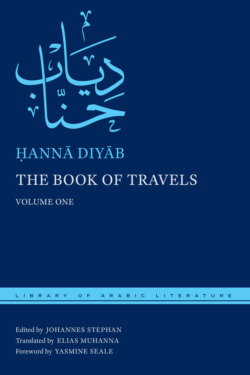Читать книгу The Book of Travels - Hannā Diyāb - Страница 17
На сайте Литреса книга снята с продажи.
This Translation
ОглавлениеOur aim has been to produce an English rendering of this work that captures the voice of Ḥannā Diyāb. The author’s gifts as a storyteller—only tantalizingly suggested by his famous involvement with the history of the Thousand and One Nights—are in evidence in The Book of Travels, where he documents his journey across the Mediterranean with dramatic flair. The linguistic register varies across the work between a conversational Levantine vernacular and more formal varieties of Arabic. We have attempted to approximate the vernacular quality of Diyāb’s language, particularly in the dialogues, without rendering it overfamiliar.
In the interest of making the translation accessible, we avoid transliterating Arabic words. Only in rare cases do we retain a word without translating it, such as when Diyāb glosses a word he suspects might be unfamiliar to his readers. With some multivalent words, we refer readers to the Glossary while translating the term differently according to the context, for instance caravansary, hostel, inn, and market for khān. Indeed, we have not insisted on translating a word the same way each time it is used, for instance rendering bustān as garden, orchard, and meadow; sarāya as palace, pavilion, mansion, and embassy; and aghā as officer and commander. Likewise, we render the term al-sharq as “the Orient” when it is used by Lucas and other Frenchmen. In all other cases, we translate it as “the East.” We have also taken the liberty of rendering some of Diyāb’s formulas in slightly different ways, for the sake of variety. For example, his favorite narrative cue following a lengthy digression is the phrase “We now return to what we were discussing” (wa narjiʿ ilā mā naḥnu bi-ṣadadihi), which we render as “But let’s get back to our story,”“As I was saying,” and the like.
We confine our endnotes to points of clarification. Readers interested in additional information are referred to the fine French translation by Paule Fahmé-Thiéry, Bernard Heyberger, and Jérôme Lentin, whose work has enriched our own.
